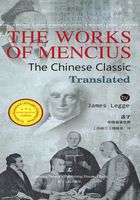
CHAPTER III
1. Ch'ăn Tsin asked Mencius, saying, 'Formerly,when you were in Ch'î, the king sent you a present of 2,400 taels of fine silver, and you refused to accept it.When you were in Sung, 1,680 taels were sent to you,which you accepted; and when you were in Hsieh,1,200 taels were sent, which you likewise accepted. If your declining to accept the gift in the first case was right, your accepting it in the latter cases was wrong.


see the 集证, on Analects, III. xxii. 9. 臣,—used as a verb. 10. Compare Pt. I. i.
CHAPTER 3. BY WHAT PRINCIPLES MENCIUS WAS GUIDED IN DECLINING OR ACCEPTING THE GIFTS OF PRINCES.
1. Ch'ăn Tsin was one of Mencius's disciples, but this is all that is known of him. 馈,—'to present an offering of food'; here, more generally, 'to send a gift',=送. 兼金,—'double metal' (I suppose 白金, or silver), called 'double, as being worth twice as much as the ordinary';—see Analects, XI. xxi. 一百, i.e.100 yí (镒), which, as in Bk. I. Pt. II. ix. 2, I estimate as 24 taels. Sung,—the present Kwei-teh in Ho-nan.Hsieh,—see Bk. I. Pt. II. xiv. The reference here,however, is inconsistent with what is stated in the note there,


If your accepting it in the latter cases was right, your declining to do so in the first case was wrong. You must accept, Master, one of these alternatives.'
2. Mencius said, 'I did right in all the cases.
3. 'When I was in Sung, I was about to take a long journey. Travellers must be provided with what is necessary for their expenses. The prince's message was, 'A present against travelling-expenses." Why should I have declined the gift?
4. 'When I was in Hsieh, I was apprehensive for my safety, and taking measures for my protection.The message was, "I have heard that you are taking measures to protect yourself, and send this to help you in procuring arms." Why should I have declined the gift?
5. 'But when I was in Ch'î, I had no occasion for money. To send a man a gift when he has no occasion for it, is to bribe him. How is it possible that a superior man should be taken with a bribe?'


that Hseih had long been incorporated with Ch'î. 前日, 今日, mark the relation of time between the cases simply. 今日 is not to be taken as= 'to-day'. 必居一于此,literally, 'must occupy (dwell in) one of these (places)'.The meaning is that on either of the suppositions he would be judged to have done wrong.
3. 赆 or 馈, 'a gift to a traveller against the expenses of his journey'. 必以赆, —it is difficult to assign its precise force to the以. I consider the whole clause to be written as from the point of view of the prince of Sung:—in regard to travellers, he considered it was requisite to use the ceremony of 赆.
4. We must paraphrase 戒心 considerably to bring out the meaning. 为, in 4th tone. 兵, 'a weapon of war',or the character may be taken here for 'a weaponbearer', 'a soldier'.
5. 未有处也, Julien says,—'sicut nos Gallice; il n'y a pas lieu a', but if it were so 处 would be the noun,

